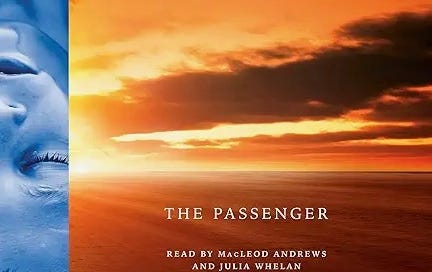BookLife Review by Carol O’Day: The Passenger (Cormac McCarthy, author)
Mississippi and Louisiana, salvage diving, mysterious plane crash, atomic bomb history, mathematics and physics, ominous federal agents, eccentric characters, schizophrenia, hallucinations, incest
The Passenger challenged and puzzled me. Cormac McCarthy’s writing is complex and dark. The novel opens with deep sea salvage divers exploring a submerged plane that crashed into the ocean off the coast of Mississippi. There are bodies on board, but one empty seat. The pilot, his flight bag and the plane’s black box are missing. Despite this opening set up, and a subsequent, ongoing investigation of the protagonist by unnamed agents, the significance of the crash and the titular missing passenger are not the heart or core of the novel. While the mysterious crash is a topic that recurs in the book, it seems to serve more as a trigger for the protagonist’s belief that the investigation is suspect and unwarranted than as a true mystery to be solved.
The reader follows the protagonist, Bobby Weston, backward and forward in time. Bobby is a contract salvage diver and travels to areas where his services are needed, from New Orleans, to Florida to South America. He is an adventure seeker and a vagabond. We learn that Bobby is haunted both by his father’s past role in the development of the atomic bomb during World War II and the resulting horrific devastation it caused, and by the suicide of his beloved, schizophrenic, younger sister. Though Bobby is spooked by the ominous agents who follow him and their invasions of his privacy, it unclear to him, and to the reader, whether the agents are pursuing Bobby because they presume he has knowledge of the plane crash, and its missing passenger(s) and equipment, or because they believe he is in possession of top-secret classified documents documenting his father’s work on the atomic bomb.
The reader also bears witness to Bobby’s sister’s escalating mental illness. Periodic chapters portray her madness, and the bizarre and frightening hallucinations she experiences. The siblings both appear to have inherited their father’s genius in physics and mathematics; Bobby largely eschews it while his sister follows the complexity of the subjects down a rabbit hole of madness. The novel also pulses with a suggestive undercurrent of an incestuous relationship between Bobby and his sister, which is both hard to process and seemingly unnecessary to the story.
The Passenger is populated with edgy and eccentric characters–fellow wandering sea divers, a trans-woman friend, a kindly bar owner, an unhinged conspiracy rattled recluse in the woods, and a gay grifter who is a gifted storyteller. McCarthy’s characters live at the periphery of society, often in its darker underbelly.
I soldiered through The Passenger out of respect for the complexity and brilliance of McCarthy’s writing. I confess that a fair amount of the content befuddled me. Many of the mathematics and physics passages and the minute details surrounding the development of the atomic bomb flew far above my head. I chose to read those passages as context and literary color. Even at the novel’s conclusion, however, the ultimate significance and connection between the plane crash, it’s missing pilot and passenger and the rest of the novel remained unclear to me. Perhaps as I ponder the book over time, I will have an epiphany. If so, I will report back.
Please support BookLife: Reviews for Readers and independent booksellers by purchasing The Passenger, using the Bookshop.org link below:





